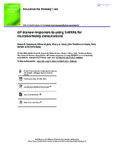GP trainee responses to using SHERPA for multimorbidity consultations
| dc.contributor.author | Swancutt, Dawn | |
| dc.contributor.author | Jack, E | |
| dc.contributor.author | Neve, Hilary | |
| dc.contributor.author | Tredinnick-Rowe, JF | |
| dc.contributor.author | Axford, Nick | |
| dc.contributor.author | Byng, Richard | |
| dc.date.accessioned | 2021-03-18T16:54:59Z | |
| dc.date.issued | 2021-03-04 | |
| dc.identifier.issn | 1473-9879 | |
| dc.identifier.issn | 1475-990X | |
| dc.identifier.uri | http://hdl.handle.net/10026.1/16960 | |
| dc.description.abstract |
UK general practitioner (GP) trainees are taught a consultation model which elicits the patients' main reason for consulting 'today'. This approach will often miss important issues for the increasing number of patients with multimorbidity. We developed the SHERPA model as a person-centred biopsychosocial framework for consulting patients with multimorbidity to address this. We aimed to examine GPs trainees' responses to SHERPA when integrated into their vocational training. The research design was qualitative and participants were GPs trainees in vocational training from one UK training location. GP trainees were introduced to the SHERPA model through interactive workshops. Qualitative data were collected from 16 participants, through four hours of teaching observation, 24 feedback templates, six practical applications of SHERPA and eight one-to-one interviews. Data were transcribed, and, using the Framework approach, systematically analysed, focussing on trainees' learning and application of the model. The results demonstrated that all participants engaged well with the teaching sessions, brought observations from their own experience, and reflected on particularly complex consultations. Half of the participants applied SHERPA successfully with their patients, particularly repeat attenders. Barriers to this approach were: selecting appropriate patients; perceived time pressure; lack of familiarity using the model; viewing SHERPA as 'additional', rather than integral, to shared decision-making in complex situations. The SHERPA model was viewed as helpful by these GP trainees for patients with whom they had established a relationship. Earlier introduction and regular support from trainers, where trainees reflect on experience of SHERPA, could increase confidence in using this method. | |
| dc.format.extent | 1-8 | |
| dc.format.medium | Print-Electronic | |
| dc.language | en | |
| dc.language.iso | en | |
| dc.publisher | Informa UK Limited | |
| dc.subject | General practitioner | |
| dc.subject | chronic disease | |
| dc.subject | communication skills | |
| dc.subject | consultation | |
| dc.subject | multimorbidity | |
| dc.subject | psychosocial | |
| dc.subject | shared decision making | |
| dc.subject | General Practice | |
| dc.subject | General Practitioners | |
| dc.subject | Humans | |
| dc.subject | Learning | |
| dc.subject | Multimorbidity | |
| dc.subject | Referral and Consultation | |
| dc.title | GP trainee responses to using SHERPA for multimorbidity consultations | |
| dc.type | journal-article | |
| dc.type | Journal Article | |
| plymouth.author-url | https://www.ncbi.nlm.nih.gov/pubmed/33657967 | |
| plymouth.issue | 5 | |
| plymouth.volume | 32 | |
| plymouth.publication-status | Published | |
| plymouth.journal | Education for Primary Care | |
| dc.identifier.doi | 10.1080/14739879.2021.1888662 | |
| plymouth.organisational-group | /Plymouth | |
| plymouth.organisational-group | /Plymouth/Faculty of Health | |
| plymouth.organisational-group | /Plymouth/Faculty of Health/Peninsula Medical School | |
| plymouth.organisational-group | /Plymouth/REF 2021 Researchers by UoA | |
| plymouth.organisational-group | /Plymouth/REF 2021 Researchers by UoA/UoA03 Allied Health Professions, Dentistry, Nursing and Pharmacy | |
| plymouth.organisational-group | /Plymouth/REF 2021 Researchers by UoA/UoA23 Education | |
| plymouth.organisational-group | /Plymouth/Research Groups | |
| plymouth.organisational-group | /Plymouth/Research Groups/FoH - Community and Primary Care | |
| plymouth.organisational-group | /Plymouth/Research Groups/Institute of Health and Community | |
| plymouth.organisational-group | /Plymouth/Research Groups/Institute of Translational and Stratified Medicine (ITSMED) | |
| plymouth.organisational-group | /Plymouth/Research Groups/Institute of Translational and Stratified Medicine (ITSMED)/CCT&PS | |
| plymouth.organisational-group | /Plymouth/Research Groups/Plymouth Institute of Health and Care Research (PIHR) | |
| plymouth.organisational-group | /Plymouth/Users by role | |
| plymouth.organisational-group | /Plymouth/Users by role/Academics | |
| dc.publisher.place | England | |
| dcterms.dateAccepted | 2021-02-04 | |
| dc.rights.embargodate | 2021-3-20 | |
| dc.identifier.eissn | 1475-990X | |
| dc.rights.embargoperiod | Not known | |
| rioxxterms.versionofrecord | 10.1080/14739879.2021.1888662 | |
| rioxxterms.licenseref.uri | http://www.rioxx.net/licenses/all-rights-reserved | |
| rioxxterms.licenseref.startdate | 2021-03-04 | |
| rioxxterms.type | Journal Article/Review |


